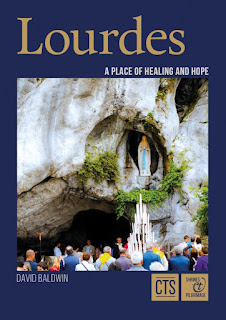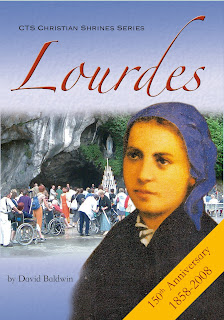CTS Christian Shrines Series
Vernon Johnson
Catholic Truth SocietyISBN 9781860824869
eISBN 9781784694746
ASIN B075P3C2CJ
CTS Booklet SP23
Over the last few years, I have read over 250 books and booklets from the Catholic Truth Society. I have greatly enjoyed many of the books in the Christian Shrines Series. This is the fifteenth volume in the CTS Christian Shrines series that I have read. I have read many books from Donal Anthony Foley. I have a university degree in Religious Studies with a specialization in Roman Catholic Thought I would have loved to have had books from this series, and many from the CTS catalogue to use as a resource during my schooling. The books from the Christian Shrines series come in a few flavours, some for going on pilgrimage, some as overviews of the message, and like this one, on the recipient of the message. But back to this specific volume on Bernadette.
The description of this volume is:
“What is the point of suffering? Why would a good God allow it? This classic text explores the Christian response to these questions in light of the apparitions at Lourdes and the life of St Bernadette, encouraging readers to meditate deeply on the cross and the value of suffering.
Suffering is something that the modern world, including many Catholics, finds very difficult to endure or even to understand. What is the point of it? Why would a good God allow it? The Christian response to these questions is one of the underlying messages from Our Lady's apparitions at Lourdes in 1858, not least through the life of Bernadette Soubirous, the seer of Lourdes, who endured so much suffering in her short life.
This classic text by Mgr Vernon Johnson, and updated by Donal Foley for the 150th anniversary of the Lourdes apparitions in 2008, encourages readers to meditate deeply on the cross and the meaning and value of illness and suffering.”
This booklet is a little different thank many in the series. It is an excellent volume in a wonderful series and I highly recommend it. The chapters in the booklet are:
Message of Lourdes
The Way of Love
Accepting Suffering
What is Humility?
The Cup He Has Given Us
The Problem of Suffering
Prayer of St Bernadette
I do not know when the original version by Mgr Vernon Johnson was published, the revised edition edited and expanded by Donal Anthony Foley was released in 2008 on the 150 anniversary of the appearance in Lourdes. The eBook Edition was released in 2017 and it was rebranded in 2019. Some editions have the subtitle ‘2008 - 150th Anniversary of the Apparitions’. This book was not exactly what I was expecting. Having read many in this series I was expecting more of a guide book or teaching. What I found was a very down to earth and practical volume on living the good Christian life, and living with suffering. As I have aged, old injuries from sports and a misspent youth have come back to haunt me. This book has helped me see those daily aches and pains in a new way. Even as I was reading I passed a few times asking God to help me accept the cup I have, and to offer my suffering for specific needs of friends and family. This book begins with these words:
“Suffering is something which modern men and women, including many Catholics, find very difficult to endure, or even to understand. “What is the point of it?” they say. “Why would a good God allow us to suffer?” In the past people largely accepted suffering, and even today, in the developing world, suffering is a part of life for many. But the whole trend of modern Western civilisation is to want to do away with pain and suffering, to rebel against them, even though experience should have taught us by now that suffering is inevitable in our world.
The Christian answer to the problem of pain and suffering, however, is that suffering, while not a good thing in itself does have a meaning and a purpose, and that, rightly understood and accepted, it can be a powerful impetus in our journey towards God. This was one of the underlying messages which emerged from the apparitions at Lourdes in 1858, not least through the life of Bernadette Soubirous, the seer of Lourdes, who endured so much suffering in her comparatively short life.”
And the next section in the book ‘True Healing and Happiness’ states:
“The vast majority of the sick people who have gone to Lourdes have not been cured, and yet the grace to accept their sufferings and offer them up lovingly to God will have been freely available to them: all that is necessary is to ask for it with faith. Despite the tremendous medical advances which have taken place since the nineteenth century, there are still many diseases which medical science is unable to deal with adequately. And this is to say nothing of the huge growth in emotional problems which affect so many in the West today. Thus we have a situation where many people are still desperately in need of healing, and perhaps in most cases are more in need of emotional than physical healing. And it is undoubtedly the case that we are all in need of spiritual healing to some degree or other.”
We are reminded that as Lourdes was growing in popularity and glory Bernadette was suffering:
“While Lourdes was passing from glory to glory, however, where was Bernadette? Hidden in her convent at Nevers in central France: stricken with sickness. What was she doing? One day some visitors asked her if she had heard of some of the recent wonders of Lourdes. She answered no. The visitors could not understand how this could be. Bernadette replied, “You see, my business is to be ill.””
And also:
“In this she was only speaking from experience. From this time on she was almost constantly ill, confined to bed, and suffering greatly. Even from her earliest years at Nevers she had been a victim of a tubercular condition of the right knee, but this developed into an abscess in 1877 which left her in constant and agonizing pain. In 1879 she became much weaker, was hardly able to eat and became quite emaciated. She was also tormented by painful sores on all her limbs. On 28th March she was anointed for the fourth and final time, dying on 16th April after a long and painful last agony.”
Her example is excellent for those of us who have saught healing and the answer has been no, or not yet:
“Sometimes, we too have to accept suffering and illness. Most of the sick who return home from Lourdes are not cured: it is also their “business” to be ill. Although we often find it hard to believe and even harder to accept, sickness and suffering are very precious, even though suffering is not something that is good in itself. Although she suffered a great deal, St Bernadette was not a masochist. In December 1878, a few months before her death, when she was confined to bed, a fellow sister noticed an image of St Bernard, her patron, nearby, and asked her about it. Bernadette responded that she prayed to him, “but I don’t imitate him at all. St Bernard loved suffering. I avoid it as much as I can.””
One of the passages that really struck me when I read this book was:
“The Reverend Mother of the convent of Nevers was waiting at the convent door. In front of her stood little Bernadette, about whom the whole Catholic world at the time was talking. The Reverend Mother moved forward to receive her as a postulant to the community and questioned her as to her gifts. “What can you do?” she asked her. Bernadette looked up at her and made this exquisite reply: “Nothing very much.” The sheer beauty of that answer! Think of it. “Nothing very much”!
That is how Bernadette became a saint, by doing nothing very much extraordinarily well; and that is how all saints are made.”
Another excellent passage is:
“For some people then, it may well be that it is their business is to be ill; that is the vocation God has given them, because that is the way God means them to be one of his saints.
We will become saints by learning the value of very little things. The little things make or break us. Suppose we were going back home uncured after Lourdes to the same difficulties, the same little irritations and annoyances. If seriously ill, the same people would be looking after us - who, although they love us dearly, often do little things that get on our nerves. Even minor illnesses can be very irritating.”
This volume is an excellent read. It not only gives us the example of Bernadette but also of:
Francisco Marto
Jacinta Marto
Alexandrina de Costa
Marthe Robin
John Paul II
At that end of that section were are informed:
“So these more modern saints and holy persons have echoed the teaching and example of St Bernadette, who, as we have seen, in her humility had said, “Nothing very much,” when the Reverend Mother asked her what she could do. Like them, Bernadette was prepared to accept her sufferings as coming from the Hand of God, and this is something we mustn’t forget.”
This is an excellent read. It is an amazing volume that I know many would benefit from read. I give this book top marks. And know it is one I will return to often!
For reviews of other books in the CTS Christian Shrines series click here.
Other Books in the CTS Christian Shrines Series:
Message of Assisi
Message of Fatima
Message of Guadalupe
Message of Walsingham
Santiago: Santiago de Compostela - The Pilgrim Way of St James
Pilgrim’s Companions:
Why Pilgrimage?
Fatima - A Pilgrim's Companion
Glastonbury - A Pilgrim's Companion
Holy Land - A Pilgrim's Companion
Lisieux - A Pilgrim's Companion
Poland: A Pilgrim's Companion
Rome - A Pilgrim's Companion
Pilgrim France: Shrines and Pilgrim Places
Books by Donal Anthony Foley:
Christian Living: The Spirituality of the Foyers of Charity
Understanding Medjugorje: Heavenly Visions or Religious Illusion?
Marian Apparitions, the Bible, and the Modern World
Medjugorje Revisited: 30 Years of Visions or Religious Fraud?
Fiction:
The Glaston Chronicles:
...
Original Editions:
…














No comments:
Post a Comment